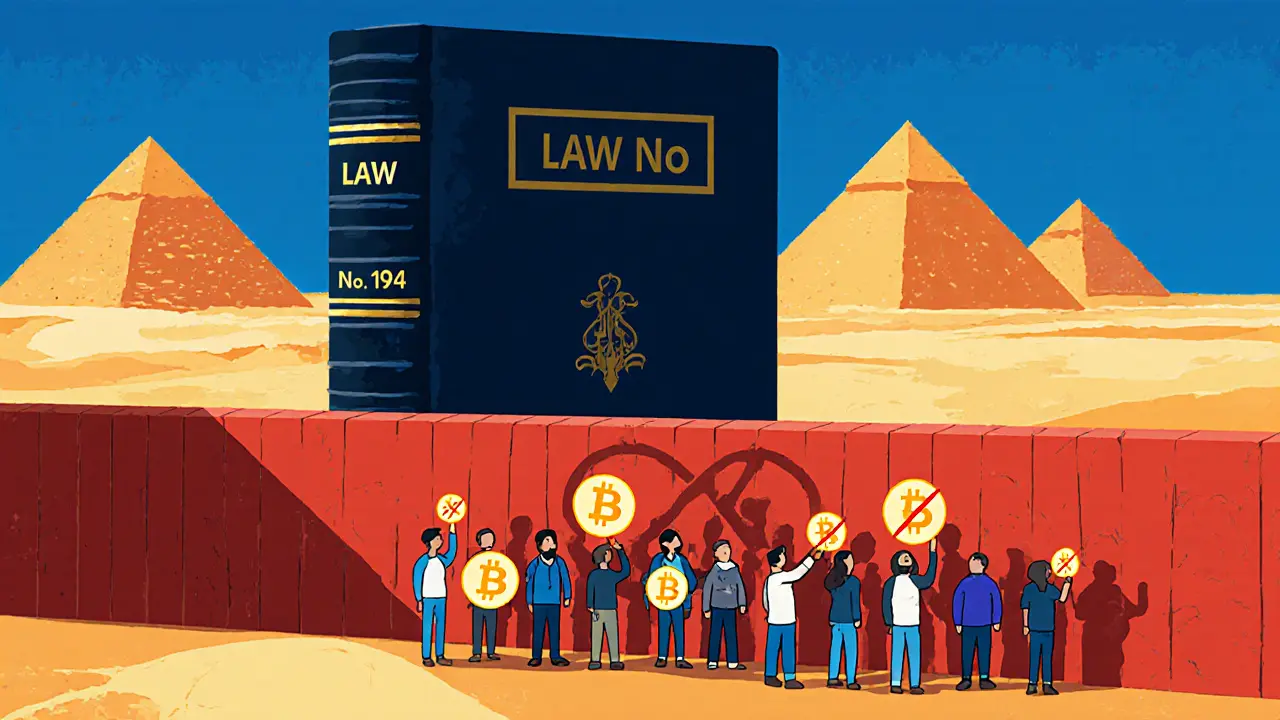Egypt Crypto User Estimator
Estimate Crypto Users in Egypt
Based on Egypt's population and estimated adoption rates, this tool calculates potential crypto user numbers.
Estimated Results
crypto holders Egypt - the headline that grabs attention, but what’s the reality behind the number?
- Egypt’s Central Bank of Egypt (CBE) outright bans crypto issuance, trading and holding under Law No.194 of 2020.
- Violating the ban can lead to imprisonment and fines ranging from 1million to 10millionEGP.
- Estimates of crypto users in Egypt are mostly speculative; no official registry exists.
- Enforcement is challenging because crypto activity can be hidden behind overseas wallets and peer‑to‑peer channels.
- Recent policy talks hint at a possible licensing framework, but no concrete timeline is set.
The Legal Landscape in a Nutshell
Egypt is a North African nation with a population of over 110million people. Its financial system is tightly controlled by the Central Bank of Egypt (CBE), the authority that enforces the country’s monetary policy.
In 2020 the CBE issued Central Bank and Banking System Law No.194, specifically Article206, which states that any issuance, trading, promotion or operation of a platform dealing with cryptocurrency without prior CBE approval is illegal. The law places Egypt among nine countries with a total prohibition on crypto activities.
How the Ban Works on the Ground
The ban applies to individuals, banks, and any financial institution. This means that you cannot open a bank account to buy or sell Bitcoin or any other digital token, nor can you advertise crypto services within Egyptian territory.
Enforcement relies on two main levers:
- Monitoring of financial transactions for suspicious patterns linked to crypto exchanges.
- Legal actions against anyone caught advertising, facilitating, or holding crypto assets domestically.
Because crypto wallets are pseudonymous, the CBE often partners with telecom providers and internet service companies to track potential off‑chain activity. Still, the underground nature of the market makes precise measurement nearly impossible.
Penalties That Keep People Away
Violators face a steep penalty regime. The law sets fines anywhere between 1millionEGP (≈$32,000) and 10millionEGP (≈$320,000), plus possible imprisonment ranging from six months to several years, depending on the severity of the offense.
These sanctions serve two purposes:
- Deterrence - the fear of a multi‑digit‑million fine discourages most retail investors.
- Signal to international partners - demonstrating a firm stance against money‑laundering and terrorism‑financing risks.
Why the "3Million" Figure Keeps Circulating
Despite the ban, social media chatter and some regional reports mention a figure of three million crypto holders in Egypt. The origin of this number can be traced to three common sources:
- Extrapolation from global crypto adoption rates applied to Egypt’s population.
- Surveys conducted by overseas exchanges that do not verify users’ residency.
- Speculative headlines that mix legitimate interest in crypto with the shock of a total ban.
Because the CBE does not publish any official statistics - and because any domestic activity would be hidden - there is no reliable data to confirm or refute the claim. In practice, most crypto activity in Egypt occurs via offshore platforms, peer‑to‑peer trades, or through VPN‑masked connections.

Potential Policy Shift: From Ban to License?
In late 2023 the CBE hinted at a possible regulatory sandbox that could grant licenses to “crypto‑related companies” under strict AML/KYC requirements. While no formal bill has been introduced, the discussion suggests a gradual move from outright prohibition to controlled allowance.
If such a licensing regime materializes, key features could include:
- Mandatory capital reserves for licensed exchanges.
- Real‑time reporting of large transactions to the CBE.
- Retention of the existing penalty range for unlicensed activity.
Until then, the legal environment remains hostile, and any domestic crypto venture would risk the severe penalties outlined above.
What the Data Really Says
Given the lack of official numbers, analysts rely on indirect metrics:
- Google Trends shows a steady increase in searches for “how to buy Bitcoin in Egypt” over the past three years.
- Blockchain explorers reveal a modest but growing number of wallets that list Egyptian IP ranges, though many use VPNs.
- Regional fintech reports note that roughly 2‑4% of the Egyptian population expresses interest in digital assets, translating to around 2‑4million people - a range that loosely matches the speculative 3million claim.
These proxies, while helpful, cannot replace a reliable census. The safest conclusion is that crypto interest is high, but actual holding numbers are hidden from the authorities.
Comparing Egypt’s Ban with Countries that Have Adopted a Regulated Approach
| Country | Policy | Penalty Range (Local Currency) | Regulatory Body |
|---|---|---|---|
| Egypt | Complete ban | 1M-10MEGP | Central Bank of Egypt |
| Germany | Licensed exchange model | Up to €500k | BaFin |
| Japan | Registered virtual‑currency exchange | Up to ¥5M | FSA |
| United Arab Emirates | Crypto‑asset license (ADGM) | Up to AED2M | UAE Central Bank |
The table highlights how Egypt’s penalties dwarf those in jurisdictions that have opted for a licensing regime. Those countries still enforce strict AML/KYC rules, but they allow legitimate businesses to operate without the threat of imprisonment.
Key Takeaways
- Egypt’s ban is rooted in Law No.194, which criminalizes any crypto activity without CBE approval.
- Penalties are severe: up to 10millionEGP and potential jail time.
- The “3million crypto holders” figure is unverified and likely stems from extrapolation.
- Enforcement is difficult; most activity lives in the shadows via offshore platforms.
- There are early signals of a possible licensing pathway, but the ban remains in force.
Frequently Asked Questions
Is it illegal for an Egyptian citizen to own Bitcoin?
Yes. Under Article206 of Law No.194, owning, buying, or selling Bitcoin without a CBE license is a criminal offense that can lead to hefty fines and imprisonment.
How are the penalties for crypto violations calculated?
The law sets a minimum fine of 1millionEGP and a maximum of 10millionEGP, with the exact amount depending on the scale of the violation, repeat offenses, and whether the activity involved large sums or facilitated illegal financing.
Can foreign crypto exchanges serve Egyptian users?
Technically no. Offering services to Egyptian residents without a CBE license violates the ban. However, many users bypass restrictions using VPNs, making enforcement challenging.
What signs indicate Egypt might relax its crypto stance?
Recent statements from the CBE about a potential licensing framework and the appearance of a fintech sandbox in policy drafts suggest a shift. No official legislation has been published yet, so the ban remains in effect.
How reliable are the estimates of 3million crypto users?
The figure is speculative. It is derived from global adoption models applied to Egypt’s population without any official survey or blockchain data to confirm it. Real numbers are likely lower and hidden.


Cynthia Rice
In the shadows of Egypt's crypto ban, one wonders if the numbers are myth or reality. The allure of forbidden wealth fuels whispers.